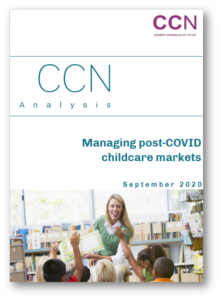
CCN Latest News, CCN News 2020 | 25 September 2020

 A study carried out by the County Councils Network (CCN) of its member councils found that every single respondent felt up to 10% of their childcare providers at least could close this winter rising to one in four in some areas, even without a second Coronavirus wave. These more remote areas that CCN’s councils represent already have less childcare choices meaning just a few closures could result in people having to travel much further or in some cases, not be able to access any childcare at all.
A study carried out by the County Councils Network (CCN) of its member councils found that every single respondent felt up to 10% of their childcare providers at least could close this winter rising to one in four in some areas, even without a second Coronavirus wave. These more remote areas that CCN’s councils represent already have less childcare choices meaning just a few closures could result in people having to travel much further or in some cases, not be able to access any childcare at all.
The findings are revealed in a new report from the CCN, whose councils cover 86% of England. The study found that councils believe the government’s interventions have helped stave off closures so far in 2020, but that providers have only ‘weathered the storm’ and will face financial difficulty without further support into the winter.
In total, 80% of respondents, who are England’s largest councils, believe up to one in ten local providers are at risk, whilst the remaining 20% are worried that figure could be as high as one in four in their areas due to increased costs of opening safely, and declining demand during the looming recession.
Disruption to the market of this scale would leave many councils unable to fulfil their statutory duty to provide ‘sufficient’ childcare for residents, especially in more remote locations.
They warn that this could ultimately impact on economic recovery efforts if parents cannot find childcare close to where they live – especially if there are more local and national lockdowns.
To address this, they are calling on the government to commit to ensuring financial support for the childcare sector until the end of the pandemic, with councils given the ability to direct funds to providers in areas where closures could have a major impact due to the smaller number of childcare services.
Currently, the government has committed to pay early education fees, administered by local authorities, at rate throughout the Autumn but has yet to extend this further.
If no new funding was made available, childminders were most at risk, according to the councils surveyed. This follows day nurseries, and sessional preschools which offer limited hours and often located in remoter areas.
The survey also shows that all but one of those councils were approached for financial assistance – and county authorities stepped up by paying early education fees upfront, reducing rents for tenants, and creating additional subsidises from government funding for those that stayed open in lockdown for the most vulnerable children and those of key workers
Currently, councils pay providers a rate for free early education for eligible children, but many providers are also reliant on private fee-paying families and many are concerned they will not see those people return due to changing working patterns and financial hardship faced by people in the immediate aftermath of the virus.
 Cllr Keith Glazier, children and young people spokesperson for the County Councils Network, said:
Cllr Keith Glazier, children and young people spokesperson for the County Councils Network, said:
“County local authorities can be proud of their efforts in helping keep our vital childcare providers in business at the height of the pandemic, offering upfront financial support alongside guidance and publicity for them.
“The government’s financial support in this time has been invaluable, but a dead stop to it in the winter will cause huge problems for providers who have only weathered the storm of Coronavirus with this assistance.
“Rural and remote areas of counties where there is already a dearth of childcare could be the most vulnerable, impacting on parents and children alike, and hampering the economic recovery efforts. This is why we will need further financial support, and the freedoms for councils to direct these funds to the areas where closures will be most catastrophic.”
Notes to editor
© 2024 County Councils Network | Credits | Site map | Cookies | Privacy Policy.